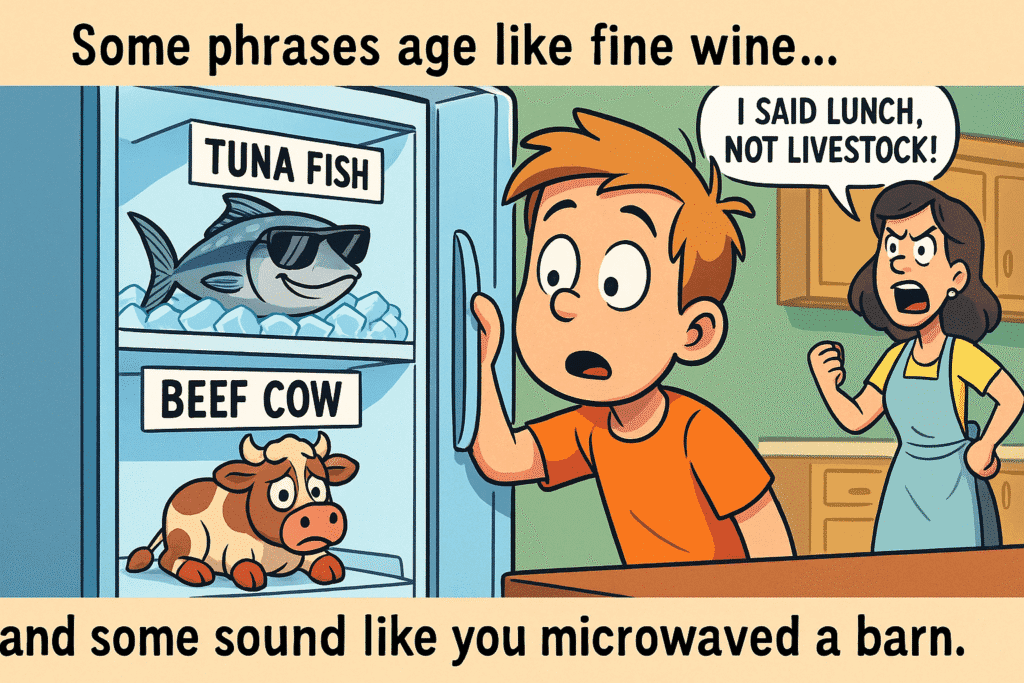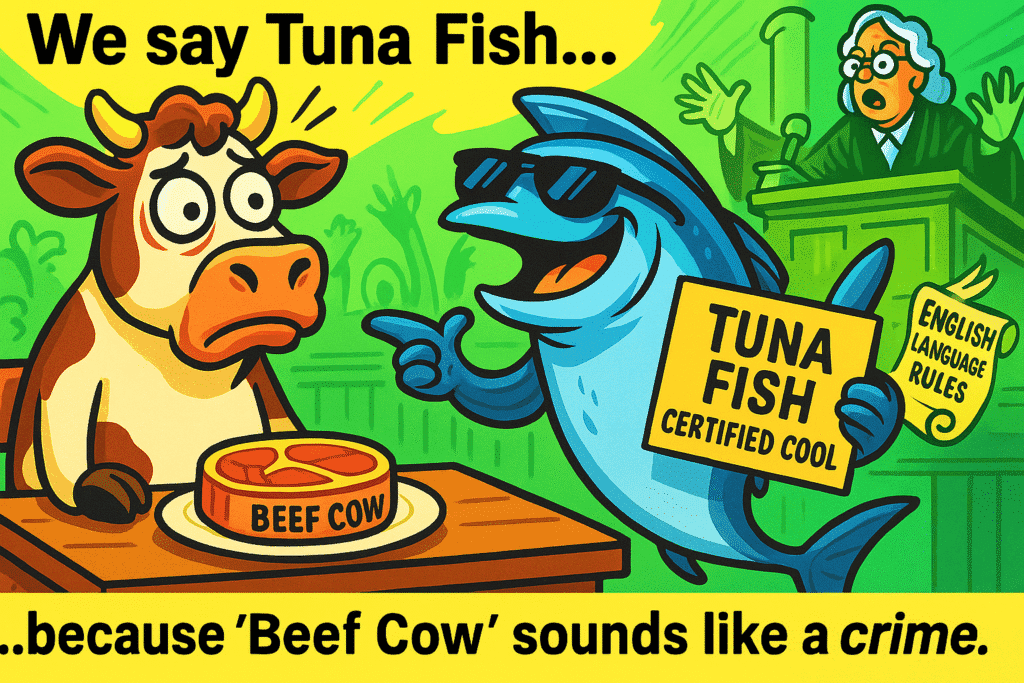The Weird Truth Behind “Tuna Fish,” Not “Beef Cow”

The History Is Funnier Than You Think
Let’s start with something deeply philosophical: Why do we say “tuna fish”… but not “beef cow”?
Seriously. Say both out loud.
“Tuna fish”? Sounds normal.
“Beef cow”? Sounds like someone just lost a spelling bee and decided to wing it.
This hilarious contradiction popped into my head during a midnight snack (as most great thoughts do). I was eating tuna—yes, from a can, yes, over the sink like a proper adult—and I caught myself calling it “tuna fish.”
Then I paused. Why? It’s not like I ever ask for “beef cow” at a burger joint.
So today, we’re diving deep (like, bottom-of-the-ocean deep) into the question: Why We Say Tuna Fish But Not Beef Cow.
By the time we’re done, you’ll be side-eyeing your sandwich and questioning everything you ever learned in English class.
"Tuna Fish" Is Fine, But "Beef Cow"? Sounds Like a Bad Idea
There’s something deeply weird about how “tuna fish” feels totally acceptable while “beef cow” feels… illegal?
I mean, picture this: you’re at a fancy dinner.
Waiter: “Tonight’s special is grilled beef cow with a side of mashed tuber.”
You: “I’ll just have the tap water.”
The phrase “beef cow” sounds like a glitch in the matrix. Yet “tuna fish” glides by unnoticed, like that one guy at a party who says nothing all night and still gets invited to the next one.
This inconsistency is what makes Why We Say Tuna Fish But Not Beef Cow such a delightful little linguistic rabbit hole.
How Childhood Lunches Reveal the Absurdity
Flashback to 3rd grade: I opened my lunchbox to reveal the most beige sandwich imaginable—tuna salad on white bread. My friend looked over and said, “Ew, tuna fish?”
I remember defensively saying, “It’s just tuna!”
She goes, “Then why does your mom call it tuna fish?”
Good question, Ashley. You had a point.
No one ever says, “I packed you a beef cow sandwich.” Yet “tuna fish” somehow got a permanent seat at the lunch table. It’s like it earned a badge of honor or something.
Childhood Lunchboxes and Linguistic Confusion
Let’s go back to elementary school.
You open your lunchbox and see a tuna sandwich. Your friend, who packed a PB&J, gives you a look like you just cracked open a jar of old socks.
They go, “Ew, tuna fish?”
You roll your eyes. “It’s just tuna.”
But now your brain is spinning.
Why does your mom always call it tuna fish?
You don’t say “chicken bird.”
You don’t say “milk cow milk.”
You certainly don’t say “lettuce plant leaves.”
Yet somehow, tuna got the extra ID badge. And now it’s walking around your sandwich like it owns the place.
Also Read : Funniest Things We Believed as Kids.
Why We Say Tuna Fish But Not Beef Cow: The History Is Funnier Than You Think
This isn’t just a modern-day oddity.
Back in the 19th century, seafood vendors weren’t exactly known for transparency. They’d sell everything from eel guts to mystery meat as “tuna.”
Sometimes what people bought wasn’t tuna at all—it was horse mackerel (which honestly sounds like a pirate insult).
So marketers started calling it “tuna fish” to make things clear: “Hey, we swear this one is a real fish.”
Over time, “tuna fish” just… stuck. Like glitter. Or your friend’s ex who keeps showing up to group events.
But “beef”? It didn’t need an explanation. Everyone already knew it came from a cow. There was no risk of mistaking it for a weasel or a squirrel. So “beef cow” never needed to exist.
A Quick Round of Semantic Satiation
Let’s play a game.
Say “beef cow” 10 times in a row.
Go on, I’ll wait.
By round 5, your brain starts to glitch. The words lose all meaning. “Beef cow” starts sounding like a cartoon character or a lost Pokémon.
That’s semantic satiation—when repetition makes a word feel made-up. And guess what? “Tuna fish” doesn’t hit that threshold. Probably because you’ve been hearing it your whole life.
So even though it’s technically repetitive, “tuna fish” feels smooth. “Beef cow” feels like your tongue is malfunctioning.
Another win for Why We Say Tuna Fish But Not Beef Cow: phonetic comfort.
English Has Trust Issues (Which Explains Tuna Fish)
Let’s face it—English is an overthinker.
We say:
Free gift
Advance warning
Close proximity
End result
Tuna fish
Why? Because we don’t trust you to get it the first time.
It’s like the language version of a mom texting, “Just reminding you again to wear sunscreen. Again. Reminder.”
That’s why Why We Say Tuna Fish But Not Beef Cow isn’t just about meat—it’s about how English works overtime trying to protect you from misunderstandings.

Tuna Is Distant, Cows Are Personal
Most of us have seen a cow. Maybe even pet one. They blink slowly. They’re adorable. You give them a name like Daisy and feel a weird urge to protect them.
Tuna? You’ve never met a tuna. If you saw one, you’d probably scream. They’re huge, fast, and terrifyingly majestic.
So when you eat “beef,” your brain kinda-sorta links it to Daisy. Saying “beef cow” forces that link harder—and makes lunch sad.
But “tuna fish”? No guilt. It’s like eating a mythical creature you only know from cans and memes.
Yet another subtle reason Why We Say Tuna Fish But Not Beef Cow makes emotional sense, too.
Beef Cow: A Word Combo That Trips Your Brain
Try this out loud:
“Beef cow. Beef cow. Beef cow…”
By repetition four, your tongue’s staging a protest, and your brain checks out. That’s called semantic burnout—when a phrase gets repeated so much, it turns into verbal mush.
“Beef cow” does that instantly because it’s wildly redundant. “Beef” already means it came from a cow—no one ever confused it with duck meat.
Meanwhile, “tuna fish” gives your brain a little clarity nudge. It’s like, “Hey, just so we’re clear—this is the swimming kind, not your neighbor’s oddly named pet.”
The Marketing Makeover: How Tuna Got a PR Boost
Marketers know one thing: repetition sells trust. “Tuna fish” sounds more complete. Like, “Yes, this is actual fish—not mystery meat from Atlantis.”
Now imagine this menu item:
“Beef cow tacos with 100% cow meat flavor!”
Yeah, that’s not doing your appetite any favors.
“Tuna fish” sounds like your aunt’s comfort food. “Beef cow”? Feels like it belongs in a dissection lab. That’s exactly why Why We Say Tuna Fish But Not Beef Cow makes sense in a world driven by labeling psychology.
Tuna Fish: A Love Letter to Lunchboxes
Tuna fish sandwiches are peak nostalgia. They taste like:
After-school cartoons
Those juice boxes that never opened right
Your grandma’s version of a “quick meal”
“Beef cow sandwich”? Not the same vibe. It sounds like something you’d accidentally step on at a county fair. Tuna wins here—not for flavor, but for sheer emotional comfort.
The English Language: A Masterclass in Confusion
English is that one friend who insists they’re logical—while wearing two different socks.
Goose becomes geese.
Mouse becomes mice.
But moose? Still moose. Why not meese?
House becomes houses. But spouse doesn’t become spice. (Tragic.)
Add Why We Say Tuna Fish But Not Beef Cow to this chaotic collection. It makes no sense—and yet, we speak it daily with suspicious confidence.
If “Beef Cow” Was Socially Acceptable…
Let’s imagine a timeline where saying “beef cow” is the norm:
“Can we get extra beef cow bits on that pizza?”
“Yeah, and maybe beef cow fries too.”
“Oh, and beef cow lasagna with triple cow!”
You’d sound like you’re stuck in a glitch. Or maybe inventing a farm-based role-playing game. Either way, this alternate universe proves why “tuna fish” gets a pass and “beef cow” does not.
Final Scoop: Why We Say Tuna Fish But Not Beef Cow Actually Works
The phrase “tuna fish” might seem redundant, but it’s got history, clarity, rhythm—and just the right level of weird.
Meanwhile, “beef cow” sounds like a child trying to name their dinner. Between overused logic, leftover French, tuna’s reputation management, and our emotional attachment to cows, it makes sense. Sort of.
So if someone questions your tuna fish habit, smile and say:
“Hey, at least I’m not out here asking for cow meat stew.”
